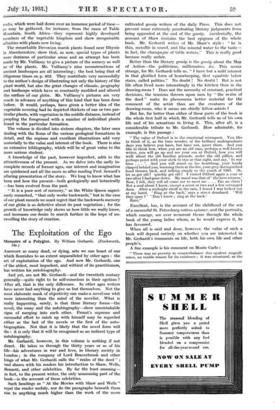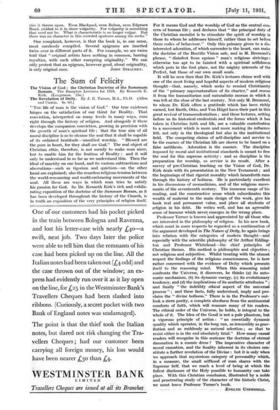The Exploitation of the Ego
AmoN0er so many dead, or dying, arts we can boast of one which flourishes to an extent unparalleled by other ages : the art of exploitation of the ego. And now Mr. Gerhardt one of the ablest, most impudent, and wittiest of its practitioners, has written his ,autobiography.
And yet, are not Mr. Gerhardi—and the twentieth century generally—quite right to be self-conscious in their egotism ? After all, that is the only difference. In other ages writers have never had anything to give us but themselves. Not the most elaborate mask of objectivity can make a novel one whit more interesting than the mind of the novelist. What is really happening, surely, is that three literary forms—the novel, the essay and the autobiography—show unmistakable signs of merging into each other. Proust's supreme and successful effort to catch up with himself may be regarded either as the last of the novels or the first of the auto- biographies. Not that it is likely that the novel form will die : it is only that it will be recognized as an indirect type of autobiography.
Mr. Gerhardt however, in this volume is nothing if not direct. He takes us through the thirty years or so of his life—his adventures in war and love, in literary society in London ; in the company of Lord Beaverbrook and other kings of what Mr. Gerhardi calls the "realm of the deed " ; and shares with his readers his introduction to Shaw, Wells, Bennett, and other celebrities. By far the least amusing— in fact, to the present writer, the only unamusing part of the book—is the account of these celebrities.
Such headings as "At the Movies with Shaw and Wells" repel the reader unduly, nor do the paragraphs beneath them rise to anything much higher than the work of the more
cultivated gossip writers of the daily Press. This does not prevent some extremely penetrating literary judgments from being appended at the end of the gossip. Incidentally, the account of Shaw contains the best epigram of the whole book. Mr. Gerhardi writes of, Mr. Shaw's style : "he is thin, metallic in sound, and like mineral water to the taste— in fact, the champagne of table waters," This is really good because really unfair. .
-
Better than the literary gossip is the gossip about the Mep Of Action—the politicians, millionaires, &e. This seems strange, for Mr. Gerhardi tells us, "I have but a mild interest in that glorified. form of housekeeping, that squabble below stairs, called politics." No doubt I No doubt I But is not life often lived more interestingly in the kitchen than in the drawing-room ? Does not the necessity of constant, practical decisions, the tensions thrown upon men by "the realm of the deed" make its phenomena better material for thi comment of the artist than are the creatures of the drawing-room, who it seems are chiefly fellow-artists ?
But far, far better than either of these parts of the book is the whole first half in which Mr. Gerhardi tells us of his own life and of his sensations in living it. This, after all, is a considerable tribute to Mr. Gerhardi. How admirable, for example, is this passage : "The value of Oxford is in the emotional retrospect. You like to 'think of it, as the time recedes, of the brilliant undergraduate days you believe you have, but have not, spent there. And, you like to think how, when you are an old man, perhaps a well-known writer, you will go up and see your son at Oxford, how you will walk about the old familiar grounds, under the old pillars, and perhaps point with your stick to this or that sight, and say. In my time . . . '. And you will stand on his hearthrug, your hands clasped behind you, warming them at the fire, your grey distinguished head thrown back, and talking simply to the youth of 1980. Oh, let us get old ! quickly get old 1 I visited Oxford again a year or two after I had gone down. My mood was that of the hero returns.' Now, I felt, they will all come out to meet me . . . Pas un chien Not a soul about I knew, except a scout or two and a few estranged dons. 'After a midnight stroll in the rain, I found I was locked out at my hotel. 'Ring at the back,' says a street drunkard. Will they open?' Don't know ; ring at the back.'
Rain."
Excellent, too, is the account of the childhood of the son of a successful St. Petersburg cotton-spinner, and the portraits, which emerge, are ever recurrent theme through the whole book of the young ladies whom, as he would express it, he has favoured.
When all is said and done, however, the value of such a book will depend entirely on whether you are interested in Mr. GerhardPs comments on life, both his own life and other people's.
A fine example is his comment on Monte Carlo :
"There was no poverty to counterbalance this opulent magnifi- cence, no visible reason for its existence ; it was unnatural, as the vice it throve upon. Even Blackpool, even Bolton, even Edgwar6 Road, yielded to it in sheer vulgarity. For vulgarity is something that need not be. What is characteristic is no longer vulgar. But there was no character in this crowded opulence among the rocks."
One complaint, however, is that the book is, in one sense, most carelessly compiled. Several epigrams are inserted twice over in different parts of it. For example, we are twice told that "original artists have nothing in common, barring royalties, with each other excepting originality." We can ofily, protest that an epigram, however good, about originality,



































 Previous page
Previous page